The automotive industry is undergoing a monumental transformation. Gone are the days when cars were solely mechanical marvels. Today, they are increasingly sophisticated software platforms on wheels, brimming with advanced driver-assistance systems (ADAS), infotainment units, connectivity features, and over-the-air (OTA) update capabilities. This software explosion presents both unprecedented opportunities and significant challenges for car manufacturers.
Consider this: the average modern vehicle contains over 100 million lines of code, a figure that's only set to skyrocket with the advent of autonomous driving and the fully connected car. Studies indicate that software-related issues are now a leading cause of vehicle recalls, costing the automotive industry billions annually.
This underscores the critical need for faster, more reliable, and more efficient software development and deployment processes. Enter DevOps for car manufacturers, a game-changing approach rapidly becoming the cornerstone of automotive innovation and efficiency.
This guide will navigate you through the intricacies of DevOps in the automotive industry, highlighting its benefits, implementation strategies, and the transformative impact it can have on your organization.
Let’s start!
What is DevOps and Why It Matters in the Automotive Industry
At its core, DevOps is a set of practices that automates and integrates the processes between software development (Dev) and IT operations (Ops) teams. It emphasizes collaboration, communication, and automation to streamline the entire software development lifecycle, from initial coding and testing to deployment and ongoing operation. The goal is to achieve faster release cycles, increased deployment frequency, more dependable releases, and optimized resource utilization.
In the automotive industry context, where software is increasingly central to vehicle functionality, safety, and user experience, DevOps in car manufacturing is no longer a luxury but a necessity. Traditional, siloed approaches to automotive software development and operations are proving inadequate to handle the complexity and speed of modern automotive software.
The lengthy development cycles and infrequent updates associated with traditional methods can hinder innovation, delay the introduction of crucial features and fixes, and ultimately impact competitiveness. DevOps for car manufacturers bridges this gap, enabling a more agile, responsive, and customer-centric approach to software development and deployment.
Why Car Manufacturers Are Embracing DevOps
Several compelling reasons are driving the rapid adoption of DevOps in the automotive industry:
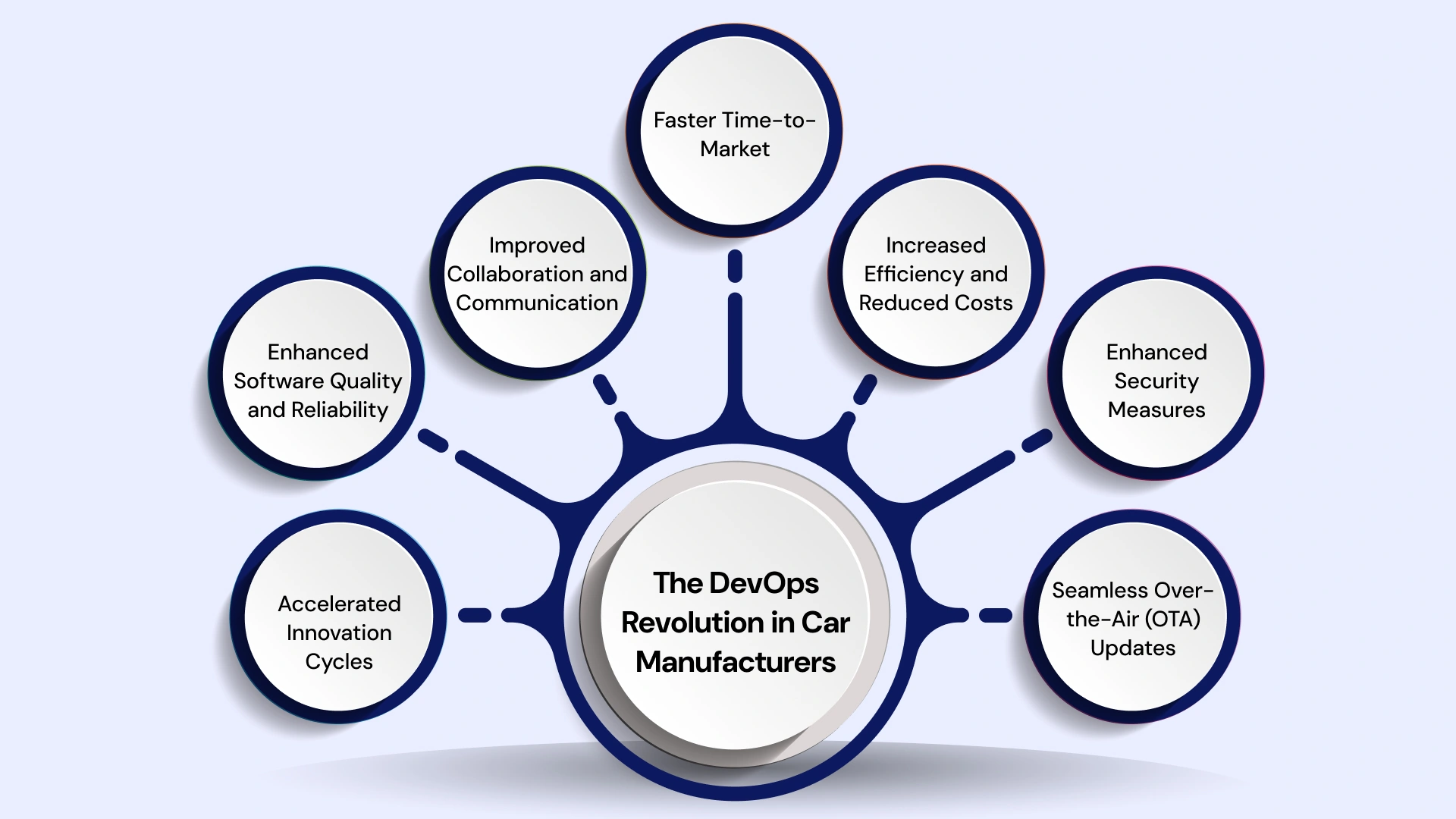
Accelerated Innovation Cycles:
The demand for new vehicle features and functionalities is constantly growing. DevOps enables faster iteration and release cycles, allowing car manufacturers to bring innovative software solutions to market more quickly and stay ahead of the competition.
Enhanced Software Quality and Reliability:
Continuous integration and continuous delivery (CI/CD) pipelines, central to DevOps, automate testing and deployment processes, leading to fewer errors, more stable software releases, and improved vehicle reliability.
Improved Collaboration and Communication:
DevOps fosters a culture of collaboration and shared responsibility between development and operations teams, breaking down silos and leading to more efficient workflows and problem-solving.
Faster Time-to-Market:
By streamlining the automotive software development and deployment process, DevOps significantly reduces the time it takes to get new software features and updates into vehicles, enhancing customer satisfaction and responsiveness to market demands.
Increased Efficiency and Reduced Costs:
By automating repetitive tasks and optimizing resource utilization, companies can achieve significant cost savings in the long run when implementing DevOps in the automotive industry.
Enhanced Security Measures:
Integrating security practices throughout the development lifecycle (DevSecOps) ensures that security vulnerabilities are identified and addressed early, a critical aspect for connected vehicles and ADAS.
Seamless Over-the-Air (OTA) Updates:
DevOps principles are crucial for implementing efficient and reliable OTA update mechanisms. These mechanisms allow car manufacturers to deliver new features, bug fixes, and security patches to vehicles remotely, improving customer experience and reducing the need for physical recalls.
How DevOps Helps Car Manufacturers Scale Software
The increasing complexity and volume of software in modern vehicles demand scalable development and deployment processes. DevOps provides the framework for achieving this scalability:
- Automation: Automating build, test, and deployment processes through CI/CD pipelines allows development and operations teams to handle increasing software complexity and release frequency without being bottlenecked by manual tasks.
- Infrastructure as Code (IaC): Managing infrastructure through code enables rapid provisioning and scaling of the environments needed for software development, testing, and deployment. This is particularly relevant with the growing adoption of cloud DevOps for auto companies.
- Microservices Architecture: Breaking down monolithic software applications into smaller, independent services allows for easier development, deployment, and scaling of individual components. DevOps practices are essential for managing and orchestrating microservices effectively.
- Containerization and Orchestration: Technologies like Docker and Kubernetes enable the packaging and management of applications in isolated containers, facilitating consistent deployment across different environments and simplifying scaling.
- Cloud Platforms: Leveraging cloud DevOps for auto companies provides access to scalable infrastructure and services, allowing car manufacturers to handle fluctuating demands and expand their software capabilities efficiently.
Key DevOps Benefits for Manufacturers
Adopting DevOps offers a powerful transformation for manufacturers, unlocking many significant advantages that drive innovation, enhance efficiency, and ultimately boost competitiveness.
Let's delve deeper into these key benefits:
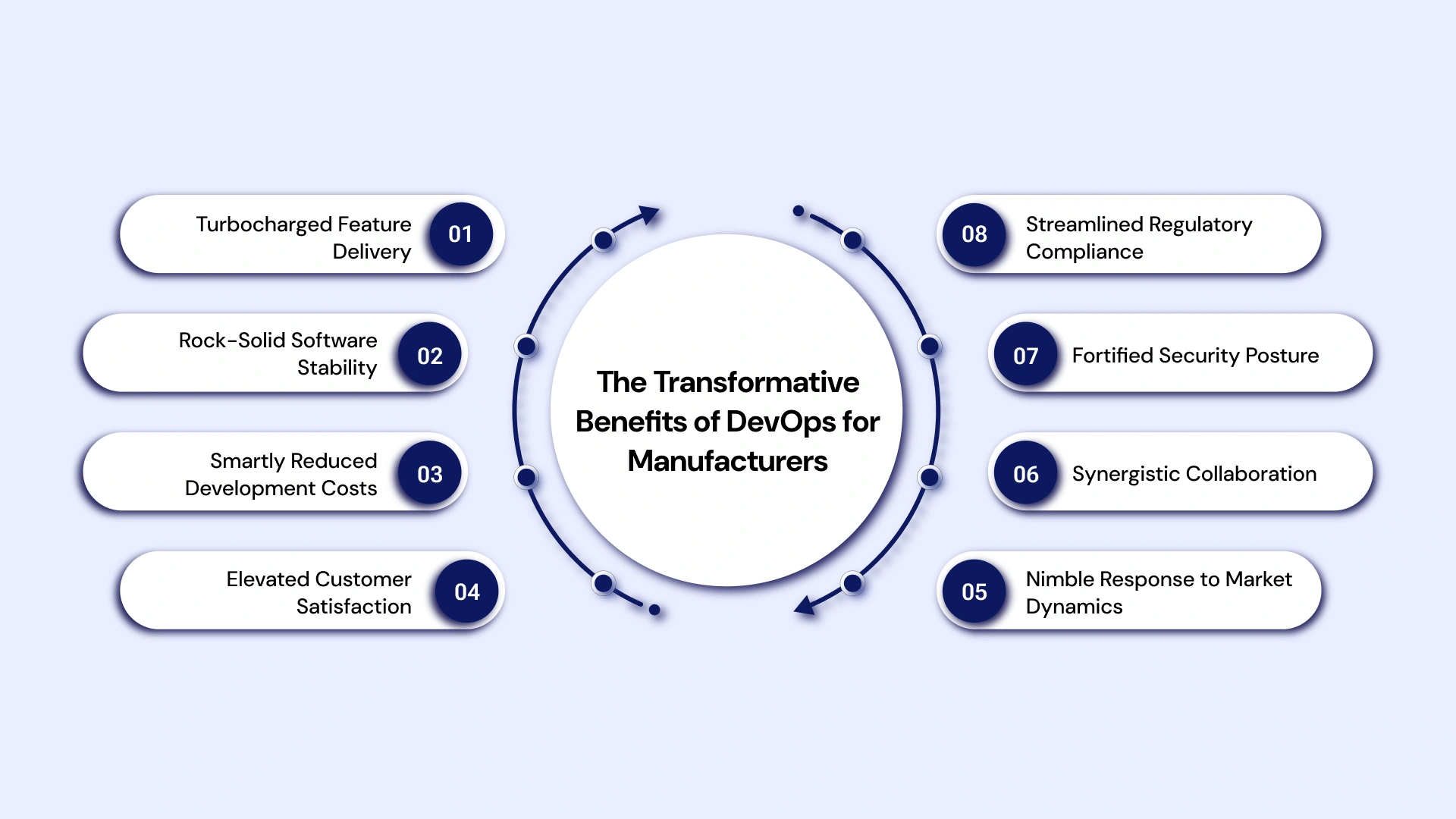
1. Turbocharged Feature Delivery:
Imagine significantly shrinking the time it takes to bring new features and crucial enhancements to your vehicles. DevOps achieves this through streamlined development and deployment pipelines. By breaking down silos and automating processes, manufacturers can deliver valuable software updates to customers at an unprecedented pace, gaining a crucial edge in a rapidly evolving market.
2. Rock-Solid Software Stability:
Software reliability is paramount for automotive DevOps solutions. DevOps practices, emphasizing rigorous automated testing and continuous monitoring, ensure that software releases are more stable and dependable. This translates directly to fewer bugs, reduced downtime, and a more seamless and trustworthy experience for vehicle owners.
3. Smartly Reduced Development Costs:
Efficiency is key to profitability. DevOps empowers manufacturers to optimize resource utilization and automate repetitive tasks throughout the automotive software development lifecycle. This intelligent approach reduces operational expenses, freeing valuable resources for further innovation and growth.
4. Elevated Customer Satisfaction:
In today's connected world, customer expectations are higher than ever. Faster updates, fewer software glitches, and the consistent delivery of innovative features directly contribute to a superior ownership experience. Manufacturers can foster greater customer loyalty and build stronger brand advocacy by embracing DevOps.
5. Nimble Response to Market Dynamics:
The automotive landscape constantly shifts, with new technologies and consumer preferences emerging rapidly. DevOps equips manufacturers with the agility to adapt swiftly to these changes. Agile development methodologies and rapid deployment capabilities enable quicker responses to market demands and seamless integration of valuable customer feedback into future vehicle iterations.
6. Synergistic Collaboration:
A collaborative DevOps culture breaks down traditional barriers between development, operations, and security teams. This fosters enhanced communication, shared responsibility, and a unified sense of purpose. The result is improved team morale, increased productivity, and a more innovative and engaged workforce.
7. Fortified Security Posture:
Security cannot be an afterthought in an era of increasing cyber threats. DevOps integrates security practices early and continuously throughout the development lifecycle – a concept known as "DevSecOps." This proactive approach helps identify and mitigate vulnerabilities early on, strengthening the overall security of vehicle software and protecting both the manufacturer and the end-user.
8. Streamlined Regulatory Compliance:
The automotive industry operates under stringent regulatory requirements. DevOps methodologies, emphasizing automation and traceability within software pipelines, provide manufacturers with the tools to meet these complex demands more effectively. This ensures smoother compliance processes and reduces the risk of costly penalties.
By embracing these powerful benefits, manufacturers can leverage DevOps to accelerate innovation, enhance efficiency, improve product quality, and drive success in the dynamic automotive landscape.
Cost-Benefit Analysis of DevOps Adoption
While implementing DevOps requires an initial investment in tools, training, and process changes, the long-term cost benefits for car manufacturers often outweigh these initial costs.
Costs:
- Tooling and Technology: Investing in CI/CD platforms, automation tools, monitoring solutions, and cloud infrastructure.
- Training and Skill Development: Upskill existing teams or hire a skilled DevOps expert to bring in the necessary expertise.
- Process and Cultural Changes: The effort required to shift from traditional, siloed approaches to a collaborative DevOps culture.
- Integration Efforts: Integrating new DevOps tools and processes with existing IT infrastructure and workflows.
Benefits (Leading to Cost Savings and Revenue Generation):
- Reduced Development and Operational Costs: Automation reduces manual effort and errors, lowering operational expenses.
- Faster Time-to-Market: Quicker release cycles translate to speedier revenue generation from new features and products.
- Improved Software Quality and Reduced Recall Costs: Fewer bugs and more stable software reduce the likelihood and cost of vehicle recalls.
- Increased Customer Satisfaction and Retention: Timely updates and reliable software enhance customer loyalty and reduce churn.
- Enhanced Innovation and Competitive Advantage: Faster innovation cycles allow car manufacturers to capture market share and stay ahead of competitors.
- Improved Resource Utilization: DevOps practices optimize resource allocation and utilization, leading to cost efficiencies.
A thorough cost-benefit analysis, tailored to each car manufacturer's specific needs and context, is crucial for demonstrating the value proposition of DevOps adoption.
Pro Tips: The DevOps toolchain is a crucial framework for any automotive manufacturer aiming for a scalable and efficient software delivery pipeline. It's a collection of tools and technologies that work together to automate and streamline the entire automotive software development lifecycle.
Key DevOps Tools & Technologies Used in Automotive IT
The automotive industry leverages a wide range of DevOps tools and technologies to build and manage its software systems:
- Version Control: Git, GitHub, GitLab, Bitbucket for managing code changes and collaboration.
- Continuous Integration/Continuous Delivery (CI/CD): Jenkins, GitLab CI, CircleCI, Azure DevOps, Travis CI for automating build, test, and deployment pipelines.
- Containerization and Orchestration: Docker packages applications into containers, and Kubernetes orchestrates and manages containerized applications.
- Infrastructure as Code (IaC): Terraform, AWS CloudFormation, Azure Resource Manager for managing infrastructure through code.
- Configuration Management: Ansible, Chef, Puppet for automating the configuration and management of systems and applications.
- Monitoring and Logging: Prometheus, Grafana, ELK Stack (Elasticsearch, Logstash, Kibana), and Splunk can monitor system performance and logs in real time.
- Cloud Platforms: Choosing the ideal cloud platform (Amazon Web Services, Microsoft Azure, GCP) to provide scalable infrastructure and services.
- Testing Automation: Selenium, JUnit, and TestNG are used to automate various types of software testing.
- Security Tools (DevSecOps): SAST (Static Application Security Testing), DAST (Dynamic Application Security Testing), vulnerability scanners for integrating security into the development pipeline.
The specific tools and technologies the car manufacturer adopts will depend on its individual needs and existing infrastructure. DevOps Consulting Services can provide valuable guidance in selecting the most appropriate toolchain.
DevOps Toolchain Orchestration for Automotive
Effective DevOps toolchain orchestration is what turns a collection of individual tools into a seamless, automated pipeline. For automotive software, this means coordinating activities across different environments, from virtual testing to physical hardware validation. Orchestration tools automate the flow of code from development to deployment, ensuring consistency and traceability.
This can include automating tasks like:
- Triggering a build when code is committed.
- Running automated unit, integration, and system tests.
- Provisioning virtual test environments using IaC.
- Deploying code to a hardware-in-the-loop (HIL) test rig.
- Pushing a validated release to a staging environment for OTA updates.
The goal is to create a fully automated, end-to-end pipeline that reduces manual effort, minimizes errors, and dramatically accelerates the pace of software delivery.
Roadmap for Implementing DevOps in a Manufacturing IT Ecosystem
Implementing DevOps is not a one-size-fits-all approach. It requires a phased and strategic roadmap tailored to the specific context of a manufacturing IT ecosystem.
Here's a detailed roadmap:
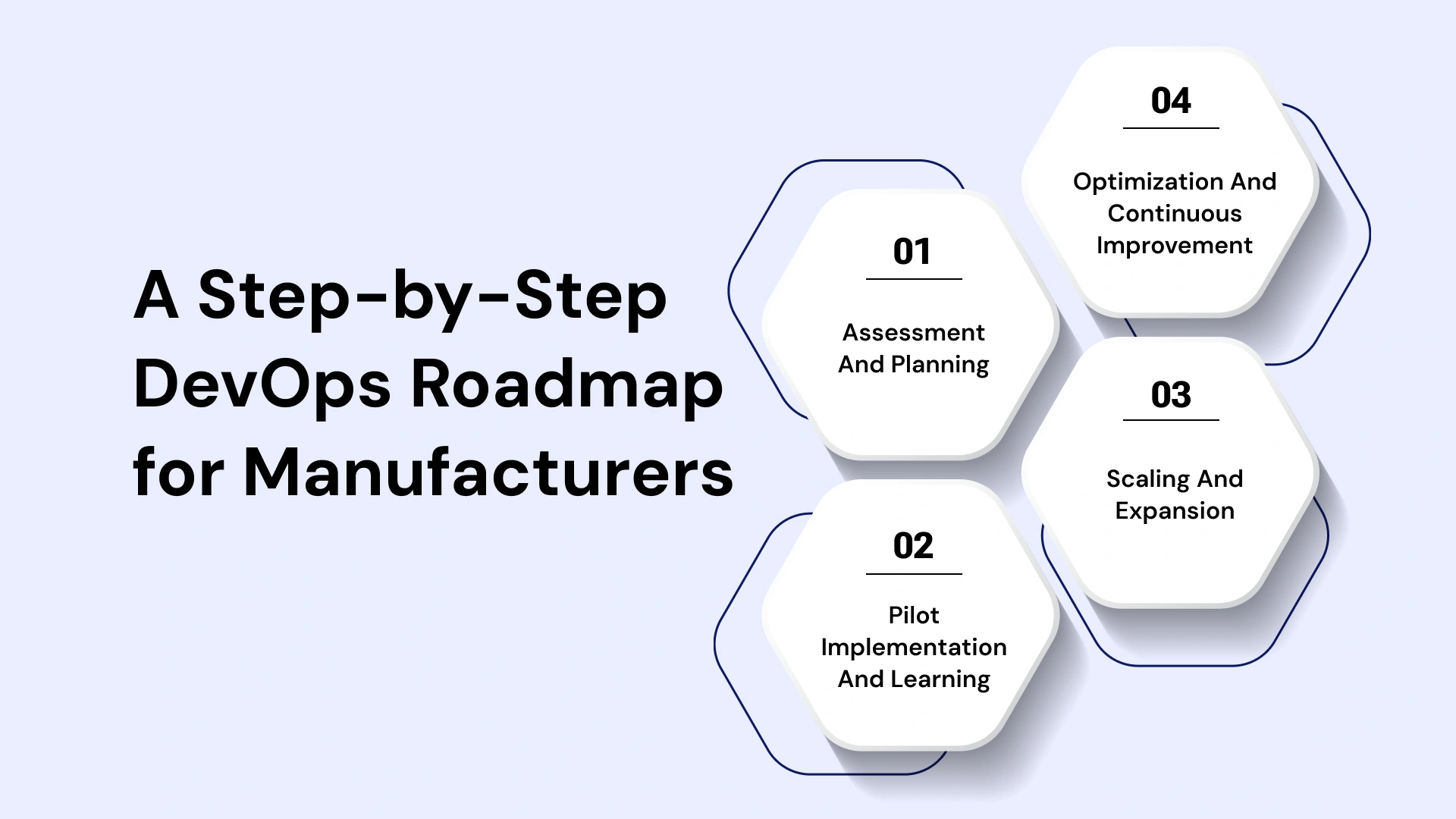
Phase 1: Assessment and Planning
- Define Goals and Objectives: Identify the business drivers for DevOps adoption, such as faster release cycles, improved quality, or reduced costs.
- Assess Current State: Evaluate the existing software development and operations processes, identify bottlenecks, and understand the organizational culture.
- Identify Key Stakeholders: Engage with development teams, operations teams, security teams, and business stakeholders to ensure alignment and buy-in.
- Select Pilot Projects: Choose small, manageable projects to implement DevOps practices and demonstrate early successes.
- Develop a High-Level Roadmap: Outline the key phases, timelines, and resources required for the DevOps transformation.
- Choose Initial Tools and Technologies: Select the initial set of DevOps tools based on the pilot projects and the existing technology stack. At this stage, consider engaging DevOps consulting for car companies.
Phase 2: Pilot Implementation and Learning
- Establish CI/CD Pipelines: Implement automated build, test, and deployment pipelines for the selected pilot projects.
- Foster Collaboration: Encourage communication and collaboration between development and operations teams through shared tools and processes.
- Implement Basic Monitoring: Set up basic monitoring and logging for the pilot applications to gain visibility into performance and issues.
- Automated Infrastructure Provisioning (Optional): If infrastructure management is a significant bottleneck, explore using IaC for the pilot projects.
- Gather Feedback and Iterate: Regularly review the progress of the pilot projects, gather feedback from the teams, and adjust the processes and tools as needed.
Phase 3: Scaling and Expansion
- Standardize Tools and Processes: Based on what was learned from the pilot projects, standardize the DevOps toolchain and processes across more teams and projects.
- Implement Advanced Monitoring and Logging: Deploy comprehensive monitoring and logging solutions to gain deeper insights into system performance and identify potential issues proactively.
- Integrate Security Practices (DevSecOps): Incorporate security testing and analysis into the CI/CD pipelines for automotive DevOps solutions.
- Expand Automation: Automate more aspects of the automotive software development lifecycle, including infrastructure provisioning, configuration management, and testing.
- Provide Training and Enablement: Invest in training and development programs to upskill the broader IT organization on DevOps principles and practices.
Phase 4: Optimization and Continuous Improvement
- Measure Key Metrics: Define and track key performance indicators (KPIs) to measure the impact of DevOps adoption, such as deployment frequency, change lead time, mean time to recovery (MTTR), and error rates.
- Continuously Improve Processes: Review and refine DevOps processes based on measured metrics and team feedback.
- Explore Advanced Practices: Investigate and implement advanced DevOps practices like chaos engineering and value stream mapping.
- Foster a Culture of Continuous Learning: Encourage teams to experiment with new tools and techniques and share their learnings across the organization.
This roadmap provides a general framework. The specific steps and timelines will vary depending on the size, complexity, and existing maturity of the car manufacturer's IT organization.
Building a DevOps Culture in Automotive Enterprises
A successful DevOps transformation is not just about implementing tools and processes; it's fundamentally about building a DevOps culture within the automotive enterprises. This involves:
- Breaking Down Silos: Fostering collaboration and communication between development, operations, security, and other relevant teams.
- Shared Responsibility: Encouraging shared ownership and accountability for the entire software delivery lifecycle.
- Automation First Mindset: Prioritizing automation of repetitive tasks to improve efficiency and reduce errors.
- Continuous Learning and Experimentation: Creating an environment where teams are encouraged to learn, experiment, and adapt.
- Embracing Failure as a Learning Opportunity: Viewing failures as opportunities for improvement rather than assigning blame.
- Empowering Teams: Giving teams more autonomy and ownership over their work.
- Open Communication and Feedback: Establish transparent and open communication channels and encourage regular feedback.
Building a DevOps culture requires strong leadership support, clear vision communication, and consistent reinforcement of the desired behaviors and values. DevOps Consulting Services can play a crucial role in facilitating this cultural shift.
DevOps Use Cases in Car Manufacturing
DevOps principles and practices are being applied across various aspects of car manufacturing:
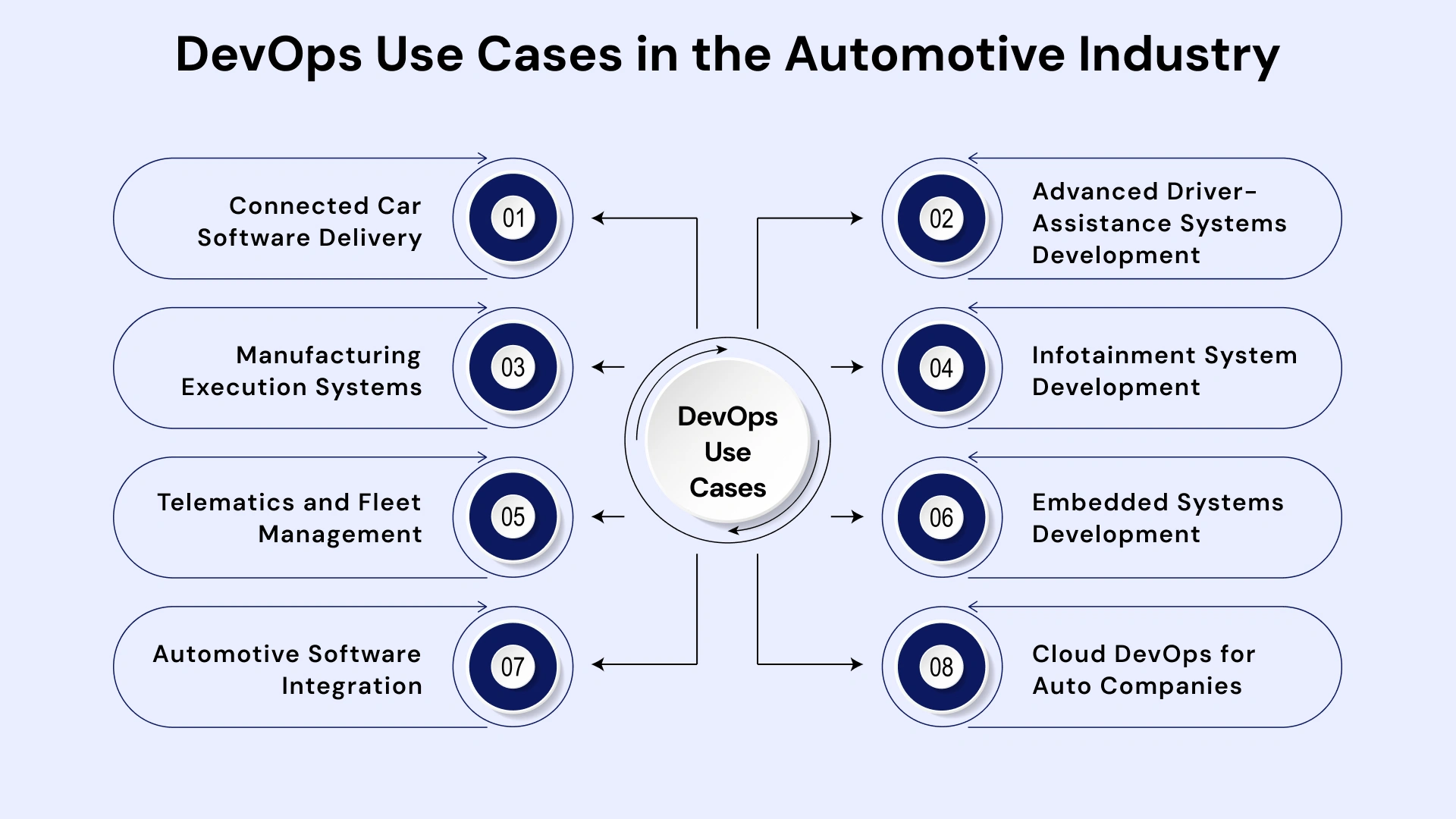
- Connected Car Software Delivery: Implementing CI/CD pipelines for the rapid and reliable delivery of software updates and new features to connected vehicles via OTA updates. This is crucial for enhancing infotainment systems, navigation, and other connected services.
- ADAS (Advanced Driver-Assistance Systems) Development: Utilizing DevOps to accelerate the development, testing, and deployment of complex ADAS software, ensuring safety and reliability through rigorous automated testing and continuous integration.
- Manufacturing Execution Systems (MES): Applying DevOps principles to improve the development and deployment of software that manages and monitors manufacturing processes on the factory floor, leading to increased efficiency and reduced downtime.
- Infotainment System Development: Leveraging Agile in automotive industry practices and DevOps to deliver engaging and user-friendly infotainment systems with frequent updates and new applications.
- Telematics and Fleet Management: Using DevOps to build and deploy scalable and reliable telematics platforms for vehicle tracking, diagnostics, and fleet management services.
- Embedded Systems Development: Applying DevOps for embedded systems to streamline the development and testing of software embedded directly into vehicle hardware components. This requires specialized tools and techniques for testing on target hardware.
- Automotive Software Integration: DevOps facilitates smoother and more efficient automotive software integration across various vehicle systems and components.
- Cloud DevOps for Auto Companies: Utilizing cloud platforms and cloud DevOps automation for better performance in auto companies to build scalable and resilient software development, testing, and deployment infrastructure.
These use cases demonstrate DevOps's broad applicability and significant impact in the automotive industry.
Common Challenges in DevOps Implementation
While the benefits of DevOps are significant, car manufacturers may encounter several challenges during implementation:
- Organizational Resistance to Change: Overcoming resistance from teams accustomed to traditional, siloed working methods.
- Lack of Necessary Skills and Expertise: Addressing the shortage of DevOps professionals with experience in the automotive industry.
- Integrating Legacy Systems: Connecting modern DevOps tools and processes with legacy IT infrastructure.
- Security and Compliance Concerns: Ensuring DevOps practices align with the automotive sector's stringent security and regulatory requirements.
- Tool Sprawl and Complexity: Managing a growing number of DevOps tools and ensuring they work together effectively.
- Defining Clear Metrics and Measuring Success: Establishing meaningful KPIs to track the progress and impact of DevOps adoption.
- Building a Collaborative Culture: Effectively breaking down silos and fostering a culture of shared responsibility.
- Specific Challenges for Embedded Systems: Applying DevOps principles to DevOps for embedded systems development often involves unique hardware dependencies and testing requirements.
Addressing these challenges requires careful planning, strong leadership, effective communication, and a willingness to adapt and learn. Engaging experienced DevOps consulting services can provide valuable support in navigating these hurdles.
DevOps Best Practices in Automotive Engineering
To maximize the benefits of DevOps in the automotive industry, car manufacturers should adhere to several best DevOps practices:
- Implement Continuous Integration and Continuous Delivery (CI/CD): Automate the build, test, and deployment processes to ensure rapid and reliable software releases.
- Embrace Infrastructure as Code (IaC): Manage infrastructure through code to ensure consistency, repeatability, and scalability.
- Automate Everything: Automate repetitive tasks across the automotive software development lifecycle, including testing, configuration management, and deployment.
- Implement Comprehensive Monitoring and Logging: Get real-time visibility into system performance and proactively identify potential issues.
- Integrate Security Early and Often (DevSecOps): Incorporate security testing and analysis throughout the development pipeline.
- Foster Collaboration and Communication: Break down silos between teams and promote open communication and shared responsibility.
- Embrace Agile Methodologies: Adopt Agile in automotive industry practices for iterative development and faster feedback loops.
- Focus on Customer Feedback: Gather and incorporate customer feedback to drive software improvements.
- Establish Clear Metrics and Measure Progress: Track key performance indicators to assess the effectiveness of DevOps initiatives.
- Invest in Training and Skill Development: Ensure teams have the necessary skills and knowledge to implement and utilize DevOps practices effectively.
- Tailor DevOps to Embedded Systems: For DevOps for embedded systems, adapt practices to account for hardware dependencies, real-time constraints, and specialized testing requirements.
Adhering to these best DevOps practices will ensure a smoother and more efficient development process for embedded automotive software.
The Future of DevOps in Automotive
The future of DevOps in automotive is poised for continued growth and evolution, driven by several key trends:

- Increased Software Complexity: As vehicles become even more software-defined vehicles, the need for efficient and scalable DevOps practices will only intensify.
- Autonomous Driving: The development and deployment of autonomous driving software, with its critical safety implications, will heavily rely on robust DevOps pipelines and rigorous testing.
- Connected Vehicles and Data Monetization: The increasing connectivity of vehicles and the potential for data monetization will necessitate faster and more frequent software updates and feature deployments, making DevOps essential.
- Edge Computing in Vehicles: As more processing moves to the edge within vehicles, DevOps practices must adapt to manage and update software on distributed in-vehicle systems.
- AI & ML Integration: Integrating AI and ML into vehicle systems will require agile development and deployment processes facilitated by DevOps.
- Cybersecurity Threats: The growing sophistication of cyber threats targeting connected vehicles will further emphasize the importance of DevSecOps and continuous security monitoring.
- Standardization and Regulation: Increased standardization and regulatory scrutiny in automotive software development will likely influence the adoption and formalization of DevOps best practices.
- Low-Code/No-Code Platforms: The emergence of low-code/no-code platforms development may integrate with DevOps pipelines to accelerate the development of specific automotive software components.
In the coming years, DevOps will become even more deeply ingrained in the fabric of automotive engineering, serving as a critical enabler of innovation, efficiency, and safety. DevOps strategy for automotive OEMs will be a key differentiator in the competitive landscape.
Accelerate Your Automotive DevOps Journey with VLink Expertise
In the fast-paced and highly regulated automotive sector, navigating the complexities of DevOps transformation requires specialized knowledge and experience. VLink understands car manufacturers' unique challenges and opportunities in embracing DevOps. Our tailored DevOps Consulting Services are designed to accelerate your journey, ensuring a seamless and practical implementation that aligns with your business goals.
VLink brings a wealth of experience in providing automotive DevOps solutions, helping organizations like yours build robust DevOps pipelines in automotive software systems, optimize automotive software integration, and leverage the power of cloud DevOps for auto companies. Our team of seasoned DevOps professionals possesses a deep understanding of the automotive industry, from embedded systems to connected car platforms.
Partnering with VLink provides tailored DevOps strategies, expert consulting for automotive needs, and accelerated implementation of best practices. Our dedicated team's focus ensures security and compliance, while our expertise optimizes software delivery and supports embedded systems, making us your dedicated partner for automotive digital transformation.
Conclusion
The automotive industry is at a pivotal point, with software playing an increasingly dominant role in vehicle functionality, safety, and the overall driving experience. DevOps for car manufacturers is no longer optional but fundamental for navigating this complex and rapidly evolving landscape.
By embracing DevOps principles, car manufacturers can achieve faster innovation cycles, enhance software quality and reliability, improve collaboration, reduce costs, and ultimately deliver greater value to their customers. The journey to DevOps transformation in automotive DevOps solutions requires a strategic roadmap, a commitment to cultural change, and a willingness to invest in the right tools and talent.
For startup owners and CXOs in the automotive sector, understanding and implementing DevOps is not just about optimizing software development; it's about securing a competitive edge in the future of mobility. By leveraging custom DevOps solutions for vehicle tech firms and adopting DevOps implementation for OEMs, the automotive industry can accelerate its digital transformation and drive the next generation of automotive innovation.
Ready to accelerate your automotive software development and deployment with VLink's DevOps expertise? Contact us now! We will help you navigate the fast lane of automotive innovation with tailored DevOps strategies and expert implementation. We are committed to empowering car manufacturers like you to thrive in the software-defined future of mobility.





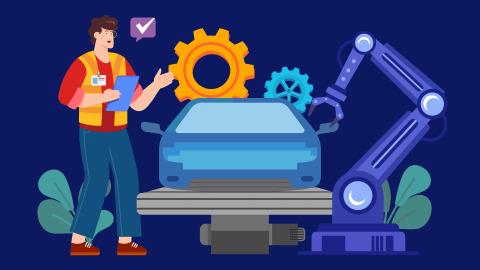




 Shivisha Patel
Shivisha Patel

















